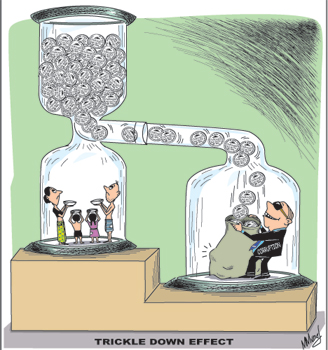Columns
Illusive inclusive growth: Exploring causes of poverty
The persistence of poverty despite economic growth has remained the puzzle of our times. Nations have learnt strategies to achieve economic growth; not the art of distributing wealth and incomes equitably. Inclusive growth is illusive in developed and developing countries around the world.
Although most countries in South Asia are experiencing reasonable economic growth, a very large number of people are left behind by the growth process. Why does poverty persist in South Asia despite reasonable high economic growth?
Three eminent intellectuals pondered over this paradox of persistence of poverty despite economic growth in a brain storming round table session organised by the South Asia Policy Research Institute (SAPRI) on August 1 at the Lakshman Kadiragamar Institute in Colombo.

SAPRI, the brain child of former President Chandrika Bandaranaike Kumaratunga, is committed to spreading ideas on how poverty in the region could be reduced and economic strategies that promote more inclusive growth could be adopted. The wide ranging stream of ideas — philosophical, historical, economic and legal — provided food for thought. The discussion, moderated by Dr. Indrajit Coomaraswamy, elicited so many thought-provoking ideas and concepts that only a few of those can be discussed here.
Global phenomenon
Lord Meghnad Desai, a distinguished professor emeritus of the London School of Economics (LSE), Founder Chair, Centre for Global Governance, LSE and member of the British House of Lords, who started the discussion, explained this paradox as being due to economic policies being pursued with the sole goal of economic growth that considered distributive measures as harming growth. This, he pointed out, was a global phenomenon and the growth of inequality was due to this thrust in development policy. More equitable distribution was today deemed anti-growth. There were, therefore, no policies to distribute assets. Such redistribution it was feared would retard economic growth. Ideas of redistribution of assets have become unfashionable economic theory.
Production determined distribution. In the developed countries, the products of lower end labour-intensive technology were imported goods that left the labour force with less income generating opportunities. Since production determines distribution and production in developed countries had shifted to more sophisticated highly specialized capital intensive technological products, those without the skills to produce these higher technological goods and services were disadvantaged. Lord Desai said the challenge was to find growth strategies that are more inclusive of people and equitable in distribution of the fruits of economic growth. This though desirable was a difficult and challenging task. Paradoxically, he emphasised that worsening inequality was a threat to economic growth.
South Asia
Dr. Shankar Achariya, former Economic Advisor to the Government of India and Honorary Professor at the Indian Council for Research and International Economic Relations (ICRIER), made the important point that South Asia had not found adequate transmission mechanisms to distribute the gains of growth, unlike East Asia. While the Indian economy and other South Asian economies grew there was a lack of restructuring of economies to distribute the workforce into manufactures and services. Too many people remain in less productive agriculture and share a small agricultural income pie. This is clear when one sees that agriculture’s share of GDP has fallen to below 20 per cent in South Asian countries (in Sri Lanka to less than 12 per cent) , but over a third of the workforce remains in rural agriculture. There was a need to make this structural change to increase the entitlements of people.
Professor Achariya urged that policies and mechanisms have to be found to shift more people to modern sectors of the economy to increase their entitlements, as well as those remaining in the agricultural and rural sectors. He pointed out that the more inclusive growth in East Asia was due to the success in shifting people from traditional agriculture to manufacturing. He also made the point to say that the aged and others who required economic support need to benefit from economic development.
Beyond economics
Dr. Kamal Hossain, former Minister of Foreign Affairs and Minister of Law of Bangladesh took the issue beyond economics. He was of the view that the problem of poverty was not due to a lack of ideas on economic development with more equitable growth, but in the realm of politics. There are any numbers of economists in South Asia who could give a blue print for more inclusive economic growth, he pointed out, but will politicians accept these ideas and strategies? Inclusive economic growth was a problem in politics rather than in economics.
Corruption was at the root of the problem, Dr. Hossain pointed out. Corruption distorts economic and social priorities and expenditure is not directed to benefit the poor. Economic policies were hostage to corruption. The large military expenditure in the region shunted public expenditure from economic and social priorities that would generate growth that benefits the poor, to unproductive avenues. Huge military expenditure makes it impractical to expend economic and social policies adequately to enhance the capacities of the poor to increase incomes.
Corruption leads to poor governance. It has been said India has a Prime Minister who was not corrupt. His rejoinder was that the Prime Minister of India was “the only uncorrupt politician” in India. The elimination of corruption was fundamental in achieving more inclusive economic and social policies.
Concluding reflections
Despite economic growth, a large number of South Asians are marginalised and unable to obtain the benefits of development. Since South Asia, one of the world’s most populous regions remains poor, divided and conflict ridden, a high proportion of the world’s poor are in South Asia. A shift in economic ideas and policies are a key factor in generating economic growth and more equitable distribution of incomes.
The conceptualisation of distributive policies as inimical to growth is at the root of not adopting inclusive economic growth strategies in the developed as well as the South Asian Countries. The era when Nicholas Kaldor’s taxation principles that sought to distribute wealth; the era of land reforms to distribute land more equitably; the Dudley Seers ideas that development that does not benefit the poor is not development; Mahbub-ul Haq’s plea to shift economic priorities towards the poor is no longer in vogue. Added to this has been the technological transformation that has given premium incomes to those in sophisticated industries.
There is a lack on the part of governments to reform inherited colonial systems to attain modernisation and adopt transmission mechanisms that benefit the poor. Rapid economic growth has led to agriculture contributing less to GDP, but still retaining a high proportion of the workforce in agriculture in South Asian countries. The lower labour productivity of agriculture owing to surplus labour has resulted in poverty persisting among a significant proportion of the population.
To get at the root of the paradox of growth without equity one has to look beyond economics to politics. Corruption and poor governance is a key factor in the persistence of poverty in the region. The distortion of public expenditure with large amounts spent on military expenditure and inadequate allocations for education and health that could benefit the poor is a fundamental reason for the persistence of poverty.
comments powered by Disqus





















